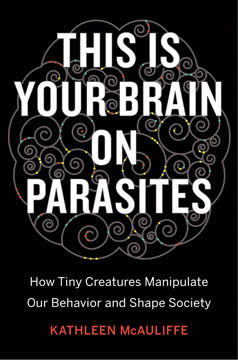Key Takeaways
1. Parasites Manipulate Host Behavior for Transmission
Simply stated, these parasites are masters of mind control.
Transmission is the goal. Parasites often alter host behavior to increase their chances of reaching their next host. This manipulation is a key strategy for their survival and propagation.
Examples of manipulation:
- A trematode compels ants to climb grass blades, making them vulnerable to grazing sheep.
- Thorny-headed worms cause crustaceans to swim to the surface, attracting waterfowl.
- Hairworms drive crickets to jump into water, facilitating their exit and mating.
Ecological impact. These manipulations have significant ecological implications, influencing predator-prey relationships and altering food chains. Parasites are not merely passive passengers but active agents in shaping ecosystems.
2. Parasites Employ Diverse Tactics: From Mind Control to Physical Alteration
Some parasites have another trick up their sleeves—an awesome hidden power that astounds and confounds even scientists who study them for a living.
Variety of methods. Parasites use a range of techniques to manipulate their hosts, including neurochemical interference, physical alterations, and behavioral coercion. These tactics are often highly specific and tailored to the parasite's life cycle.
Examples of diverse tactics:
- Jewel wasps inject venom into cockroaches' brains, turning them into docile zombies.
- Leucochloridium flatworms invade snails' eyestalks, creating colorful, pulsating displays to attract birds.
- Guinea worms induce hosts to immerse their limbs in water, releasing larvae.
Sophistication of manipulation. The complexity and precision of these manipulations often surprise scientists, highlighting the evolutionary arms race between parasites and their hosts. Some strategies seem so clever that only a human or an omniscient god could have dreamed them up.
3. The Behavioral Immune System: Our Psychological Defense Against Parasites
Mounting research suggests that hosts have developed powerful psychological defenses against parasites.
Mental shield. Hosts have evolved psychological defenses, known as the behavioral immune system, to avoid infection. This system influences our habits, traits, and even cultural norms.
Examples of behavioral defenses:
- Disgust: An emotion that prompts us to avoid potential sources of contamination.
- Hygiene practices: Washing hands, cleaning surfaces, and avoiding contact with sick individuals.
- Food preferences: Avoiding foods that are likely to be contaminated or spoiled.
Cultural influence. Our behavioral defenses have become tied to abstract and symbolic ways of thinking, shaping our political beliefs, sexual attitudes, and intolerance toward those who break societal taboos. These defenses are amplified through learning and cultural transmission.
4. Toxoplasma Gondii: A Master Manipulator of Mammalian Brains
By tinkering with the rodent’s neural circuits—exactly how is still a matter of fervid study—the invader transforms the animal’s deep innate fear of cats into an attraction, thus luring it straight into the jaws of its chief predator.
Cat parasite. Toxoplasma gondii is a single-celled parasite that infects the brains of rats, altering their behavior to make them attracted to cats. This manipulation increases the parasite's chances of completing its life cycle in the feline gut.
Human infection. Humans can become infected with T. gondii through contact with cat feces or consumption of undercooked meat. The parasite may be linked to personality changes, mental illnesses, and reckless behavior.
Research findings:
- Infected men are more likely to break rules and are more reserved and suspicious.
- Infected women are more likely to abide by rules and have warmer, more outgoing personalities.
- Both infected men and women have slower reaction times.
5. The Gut Microbiome: A Hidden Controller of Mood and Behavior
Directly or indirectly, parasites manipulate how we think, feel, and act.
Microbial influence. The gut microbiome, consisting of trillions of microorganisms, can influence our mood, behavior, and even our weight. These microbes produce neurotransmitters and hormones that affect brain function.
Mechanisms of influence:
- The enteric nervous system: A network of neurons in the gut that communicates with the brain via the vagus nerve.
- Metabolites: Psychoactive compounds produced by gut bacteria that can affect brain function.
- Immune system: Gut bacteria can engage the immune system, which can influence mood and energy levels.
Probiotic potential. Manipulating the gut microbiome with probiotics may offer a new approach to treating mood disorders and other mental health conditions. The gut is now considered a second brain.
6. Disgust: The Emotion That Shapes Morality and Social Norms
Our most visible defense is our skin, which provides a thick barrier to the hordes of microbes that populate its surface.
Germ shield. Disgust is an emotion that evolved to protect us from parasites and pathogens. It prompts us to avoid potential sources of contamination, such as feces, vomit, and spoiled food.
Moral implications. Disgust has become intertwined with our moral judgments, influencing our attitudes toward social norms, ethical transgressions, and even political ideologies. This connection can lead to prejudice and discrimination.
Cultural influence. Disgust shapes our cultural practices, including hygiene standards, food preferences, and sexual mores. It also influences our social interactions, leading us to shun those who violate societal norms.
7. Parasite Prevalence Influences Cultural and Societal Structures
Numerous lines of evidence suggest that the prevalence of parasites in our broader communities influences the foods we eat, our religious practices, whom we choose as mates, and the governments that rule us.
Cultural impact. The prevalence of parasites in a community can influence a wide range of cultural and societal structures, including religious practices, political systems, and social norms. High parasite stress often leads to collectivism and authoritarianism.
Examples of cultural influence:
- Food preferences: Spicier foods in warmer climates to combat bacterial growth.
- Religious practices: Rituals and taboos designed to minimize contact with contaminants.
- Political systems: Authoritarian regimes in regions with high parasite stress.
Geopolitical implications. Understanding the influence of parasites on culture and society can provide new insights into global health, international relations, and the evolution of human behavior. Reducing parasite stress may promote more liberal and democratic societies.
Last updated:
FAQ
What’s This Is Your Brain on Parasites by Kathleen McAuliffe about?
- Exploration of parasitic mind control: The book investigates how parasites manipulate the behavior of their hosts, including humans, to enhance their own survival and transmission.
- Interdisciplinary approach: McAuliffe draws from neuroscience, parasitology, psychology, anthropology, and evolutionary biology to explain the complex interactions between parasites and hosts.
- Societal and cultural impact: The narrative extends from molecular mechanisms to the influence of parasites on human culture, prejudice, and even political systems.
Why should I read This Is Your Brain on Parasites by Kathleen McAuliffe?
- Reveals hidden biological influences: The book uncovers the surprising extent to which parasites can control host behavior, challenging assumptions about free will and personal agency.
- Bridges science and society: McAuliffe connects scientific discoveries to real-world issues like mental illness, traffic accidents, and cultural differences, making the science accessible and relevant.
- Engaging storytelling: Through vivid examples and compelling narratives, the book reads like a medical thriller while delivering scientific rigor.
What are the key takeaways from This Is Your Brain on Parasites by Kathleen McAuliffe?
- Parasites shape behavior and society: Tiny organisms can manipulate host behavior, influencing everything from risk-taking to cultural norms.
- Behavioral immune system: Humans have evolved psychological defenses, such as disgust and social avoidance, to reduce infection risk.
- Implications for mental health: Parasitic infections and gut microbiota are linked to mental illnesses, suggesting new avenues for treatment and understanding.
- Challenging free will: The book raises questions about how much control we truly have over our actions, given the subtle influence of parasites.
What are the most memorable quotes from This Is Your Brain on Parasites and what do they mean?
- “We are not alone in our bodies.” This quote highlights the idea that humans are host to countless microbes and parasites that can influence our behavior and health.
- “Disgust is our behavioral immune system.” This phrase encapsulates the book’s argument that emotions like disgust evolved to protect us from disease.
- “Parasites are the puppet masters of the animal kingdom.” This quote underscores the central theme that parasites can control the minds and actions of their hosts, often in astonishing ways.
How does This Is Your Brain on Parasites by Kathleen McAuliffe explain the concept of the behavioral immune system?
- Definition and function: The behavioral immune system refers to psychological mechanisms—like disgust and avoidance—that help humans steer clear of infection risks.
- Influence on social attitudes: This system can increase prejudice and social conservatism, as people unconsciously avoid those perceived as potential sources of disease.
- Interaction with physical immunity: Disgust and disease cues can trigger immune responses, showing a link between psychological and physiological defenses.
What are the most striking examples of parasitic manipulation described in This Is Your Brain on Parasites?
- Trematode and ant behavior: A parasite causes ants to climb grass, making them more likely to be eaten by sheep, thus completing the parasite’s life cycle.
- Hairworm and cricket suicide: Hairworms induce crickets to jump into water, where the worm emerges and continues its development.
- Toxoplasma gondii and rodents: This cat parasite makes rodents attracted to cat urine, increasing their chances of being eaten by cats and facilitating the parasite’s transmission.
How does the cat parasite Toxoplasma gondii affect human behavior according to This Is Your Brain on Parasites?
- Widespread latent infection: Around 30% of people globally carry T. gondii cysts in their brains, often without symptoms.
- Personality and risk changes: Infected men may become more suspicious and rule-breaking, while infected women may become more outgoing and warm.
- Links to mental illness and accidents: Studies suggest higher rates of schizophrenia, suicide attempts, and traffic accidents among infected individuals, possibly due to changes in brain chemistry.
What is neuroparasitology, and why is it important in This Is Your Brain on Parasites by Kathleen McAuliffe?
- Definition of neuroparasitology: This emerging field studies how parasites manipulate the nervous systems and behavior of their hosts.
- Relevance to human behavior: Neuroparasitology challenges traditional views of free will and mental health by revealing that many behaviors may be parasite-influenced.
- Medical implications: Insights from this field could lead to new treatments for mental illnesses linked to infections and strategies to disrupt parasitic manipulation.
How do gut bacteria influence human behavior and mental health in This Is Your Brain on Parasites?
- Gut-brain communication: The microbiome produces neurotransmitters and hormones that affect mood, anxiety, and cognition, communicating with the brain via the vagus nerve and immune system.
- Evidence from animal studies: Germfree mice show impaired learning and altered social behavior, which can be normalized by introducing healthy microbiota.
- Potential therapies: Some probiotics have been shown to improve learning and reduce anxiety and depression, suggesting possible therapeutic uses for mental health.
How does This Is Your Brain on Parasites by Kathleen McAuliffe connect parasites to human culture and societal norms?
- Behavioral immune system and culture: Psychological defenses against infection influence political beliefs, sexual attitudes, and social prejudices.
- Cultural differences and pathogens: Societies in high-parasite regions tend to have more conservative norms and stricter taboos, possibly as adaptations to infection risk.
- Influence on mate choice and religion: Parasite presence may shape mate selection and the development of religious practices that promote hygiene and social cohesion.
What is the parasite-stress model of sociality described in This Is Your Brain on Parasites by Kathleen McAuliffe?
- Theory overview: The model links high parasite prevalence to cultural traits like collectivism, authoritarianism, and religiosity, promoting in-group sociality to reduce infection risk.
- Geographic and societal effects: It explains variations in individualism, political systems, and gender equality based on historical parasite loads.
- Broader implications: Parasite stress may influence war, civil strife, and economic productivity, with reduced parasite burden potentially fostering liberalization and peace.
How do animals and humans defend themselves behaviorally against parasites, according to This Is Your Brain on Parasites by Kathleen McAuliffe?
- Sickness behavior: Fever, lethargy, and loss of appetite are adaptive responses coordinated by the brain and immune system to fight infection.
- Grooming and hygiene: Animals groom themselves and others, use tools, or enlist other species for cleaning; humans instinctively avoid feces and sick individuals.
- Self-medication and natural remedies: Animals and humans use bitter plants, clay, and aromatic substances to combat parasites, reflecting an evolved healing instinct.
- Avoidance and social distancing: Both animals and humans avoid contaminated areas and diseased individuals, forming a behavioral immune system to reduce infection risk.
Review Summary
This Is Your Brain on Parasites explores how parasites and microbes influence human behavior and society. Reviewers found the book fascinating, particularly the sections on animal parasites and gut bacteria. Some criticized the later chapters for being speculative and deviating from the main topic. Readers appreciated the accessible writing style but noted potential bias and oversimplification. Many found the book thought-provoking, though some questioned the accuracy of certain claims. Overall, it was seen as an intriguing introduction to parasitology's potential impact on human life.
Similar Books






Download PDF
Download EPUB
.epub digital book format is ideal for reading ebooks on phones, tablets, and e-readers.





